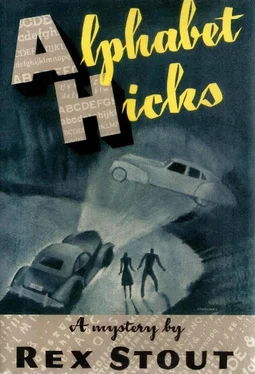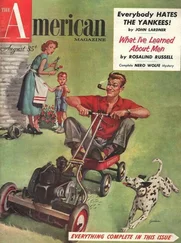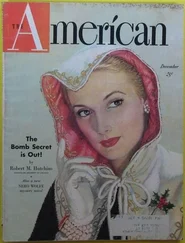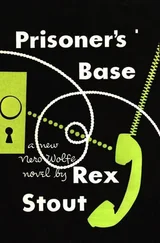If Judith Dundee had not glanced at the name of the taxi driver, there before her on the framed identification card attached to the panel, she might eventually have found some other way out of her trouble. Or she might not.
What caused her to glance at the name was a little incident that occurred when the taxi, with her in it, stopped for a red light at 50th Street and Park Avenue. Three or four pedestrians eyed the cab to make sure it was going to stop, and the face of one of them, a well-dressed and dignified gentleman who might have been on his way to a directors’ meeting, lit up with pleased recognition. He stepped from the curb to the side of the cab, thrust a hand in to the driver for a shake, and offered a greeting in the tone he would have used to a fellow director:
“Hello, Hicks, how are you?”
That was the first and last appearance of the well-dressed gentleman in Judith Dundee’s life, but in that brief moment he did her a valuable service. Her mind jostled momentarily from its concentration on the stew she was simmering in, she glanced at the framed card on the panel and saw the name “A. Hicks.” The “A” pushed speculation further and aroused memory, as the cab started forward and rolled on uptown.
She remembered the yellowish brown eyes which, by their glint and the configuration of their lids, looked like a cat’s or tiger’s eyes... and the magazine article she had read about him a year or so ago, a Profile in the New Yorker ... Harvard Law School... his melodramatic disbarment during his first year of practice... submerged years not revealed... night watchman... subway guard... the famous Harley case... the girl with clothespins on her fingers and toes...
Preoccupied as she had been when she entered the cab at 40th Street, she had had no glance for the face of its driver. Now, when it stopped in front of her apartment house in the Seventies on Park Avenue, she did not step out though the halberdier with no halberd opened the door. Instead, she leaned forward to the opening:
“Mr. Alphabet Hicks?”
The driver’s head turned, came around to her, and she saw his face — and the eyes. They were fully as remarkable as she had remembered them to be. She asked inanely:
“So you’re driving a taxi now?”
“No,” Hicks said.
She laughed nervously. “It was a stupid question.” She shook her head at the halberdier and he closed the door and retreated across the sidewalk. She resumed, “Of course you don’t remember me. About a year ago — you were working for a tree company then — I read that article about you — I wanted you for the lion at a dinner party and you wouldn’t come—”
“Dundee,” Hicks said.
“Then you do remember?”
“No, I was just guessing. There’s a car behind that wants to get in here.”
“Let them—” She glanced back; and the impulse that had been fluttering in her took control. “Look,” she said decisively, “I want to talk with you. Not to persuade you to come to a dinner party. I’m in trouble.”
One end of his wide mobile mouth curved upwards and made him look sardonic. “What kind of trouble?”
“I can’t tell you — it’s a long story. You can park around the corner and come up to my apartment. Will you? Please?”
“Okay.” He eased the gear in.
Judith Dundee wasn’t forty-five years old, but in a few months she would be. Whether she looked it or not depended on the time of day or night, the lighting, the state of her mind and nerves, and who was doing the looking. As far as physical details were concerned — the smooth well-kept skin, the large dark eyes, the brown hair still brown, the throat nicely curving from a chin that was her daintiest feature — she was quite capable of being taken for under thirty, when the conditions were ideal.
On that Wednesday in September, however, the conditions were apparently far from ideal. She looked distinctly draggy as she sat on a divan in a corner of the slightly grandiose living room of her duplex apartment high above Park Avenue.
“The trouble I’m in,” she said, “is very — intimate.”
The taxi driver merely nodded. There on a chair, he looked less than ever like a taxi driver, even disregarding the details that his face was too clean and his clothing not greasy enough.
“I mean,” Judith said, “that I wouldn’t want anyone to know about it. But I have to get help from somebody. I was thinking of going to a detective agency this afternoon, but I don’t know any, and it would be so distasteful—” She made a face. “Not that it isn’t already distasteful. Then I saw you and remembered what I had read about you... and the marvelous things you had done... and your eyes were the cleverest I ever saw...” She stopped and looked embarrassed.
“You’ll have to make the sale,” Hicks said dryly. “I just accepted your invitation to come up and listen.”
“I know you did.” She sat and looked at him a moment, then said abruptly in a new and harsher tone, “My husband has gone crazy.”
Hicks grunted. “I’ve never handled a maniac—”
“No, no,” she said impatiently. “But he has. It’s simply insane. We’ve been married twenty-five years. Our life together hasn’t been exactly continuous bliss — for one thing, I’m extravagant, I always have been — not to mention any of his faults — but we’ve done fairly well. We’ve raised two children, which is what marriage is for, I believe, and we’ve never tried to poison each other. I imagine our friends would say that our marital happiness rating is well above the average. And suddenly one day last week, Tuesday, a week ago yesterday, he came home from the office and confronted me with a perfectly terrible look in his eyes and asked me how often I had been to see Jimmie Vail!”
She halted. Hicks looked uncomfortable. He muttered, “Jimmie Vail?”
“Yes!”
“What’s that, a man?”
“Certainly he’s a man. I was dumfounded. When I could speak I said that if at my age I went in for clandestine meetings with a man I would pick a better specimen than Jimmie Vail. With the same eyes and voice he said, ‘I don’t mean that. You know what I mean. I mean how often have you been to his office to betray the secrets of my business. I have proof. You might as well tell me.’ That left me speechless again. Before I could speak he said, ‘Who did you get it from, Brager? Did you worm it out of Brager? And did you pay him what he wanted? And how much did Vail pay you? Did you get a good price?’
“I asked him if he was crazy. He said it was useless for me to try to deny it, he knew I had done it, all he wanted was the details, the full story, so he could decide what to do. It was impossible to get him to talk sense. We were here in this room. Somebody came, and he left and didn’t return that night. The next day, towards noon, he came, and started all over again, just the same gibberish. It was awful. Finally he said if I would go to his office at four o’clock that afternoon he would prove it to me, and I said I would go, and he left. I really thought he was unbalanced. Around three o’clock he telephoned and told me not to come to the office, just told me that and hung up. I went anyway, and was told he wasn’t there. That evening he came home late — and absolutely refused to discuss it! He still refuses to discuss it! If I try to, he leaves. Before people, he treats me — he tries to act as if nothing had happened. When we’re alone — we just aren’t alone. We have adjoining bedrooms, and he keeps the connecting door locked. When I went into his room by the hall door a few nights ago — well — he simply won’t discuss it! Did you ever hear of anything so utterly senseless? Now did you?”
Читать дальше












